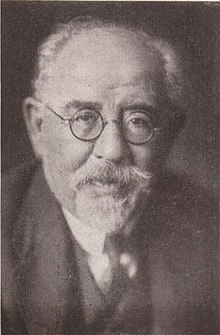17:
194:
239:
123:(The pessimism of the 19th century: Schopenhauer and Hartmann, Budapest, 1884, prize essay). Alexander, together with Professor Józef Bánóczi, later edited a seminal series of books on philosophers, the
77:
and esthetics at the
National Theater Academy, and on the latter subject and on the history of civilization at the Francis Joseph Polytechnic. He was a corresponding member of the
89:, a Hungarian-American psychoanalyst and physician, who is considered one of the founders of psychosomatic medicine and psychoanalytic criminology, and maternal grandfather of
280:
265:
93:, a Hungarian mathematician who made contributions in combinatorics, graph theory, number theory but mostly in probability theory.
47:
on 13 April 1850, and educated in his native city, later attending German universities, where he pursued studies in the fields of
65:(scientifically oriented high school) in Budapest, and in 1878 was admitted as a docent into the faculty of philosophy at the
270:
275:
300:
240:
Váltó- és keresztkapcsolások: a tudásközvetítés folyamatai a két világháború közti magyar és német nyelvű kultúrában
162:
285:
119:
290:
78:
295:
185:
The cities of Buda and Pest and the town of Óbuda were merged as the city of
Budapest in the fall of 1873.
230:
217:
66:
208:
70:
260:
255:
27:(1850–1927) was a Hungarian writer of Jewish background, and a professor of philosophy and
8:
115:
105:(The idea of the history of philosophy, in consideration of history in general, 1878);
90:
82:
128:
161:
However, Alexander became pariah in the nationalistic, anti-Semitic environment of
149:. He was an active writer on matters of education, editing the pedagogical journal
166:
86:
203:
249:
198:
142:
107:
16:
73:, where he became a full professor in 1895. From 1892, he also lectured on
137:
197: This article incorporates text from a publication now in the
169:, and spent four years abroad. He died in Budapest in 23 October 1927.
132:
74:
61:
52:
48:
28:
103:
A philosophia történetének eszméje, tekintettel a történetre általában
59:. On his return to Hungary he was appointed to a teaching post in a
56:
44:
85:, a major force in Hungarian literature. He was the father of
127:, for which he did translations and annotations of
247:
145:. Jointly with Bánóczi, he translated Kant's
202:
281:Academic staff of Eötvös Loránd University
112:(Life, development and philosophy, 1881);
15:
235:and from the Hungarian Knowledge page.
248:
39:Bernhard (Bernát) Alexander was born
266:19th-century Hungarian male writers
110:. Élete, fejlődése és philosophiája
13:
156:
34:
14:
312:
206:; et al., eds. (1901–1906).
212:. New York: Funk & Wagnalls.
192:
179:
1:
172:
114:A XIX. század pesszimizmusa:
79:Hungarian Academy of Sciences
271:Writers from Austria-Hungary
101:Alexander's chief works are
7:
276:19th-century Hungarian Jews
10:
317:
167:Miklós Horthy's government
301:19th-century translators
96:
209:The Jewish Encyclopedia
147:Critique of Pure Reason
286:Hungarian philosophers
71:University of Budapest
21:
291:Hungarian translators
67:Faculty of Humanities
19:
125:Filosofiai Irók Tára
81:and a member of the
296:Philosophers of art
153:from 1882 to 1886.
25:Bernhard Alexander
22:
20:Bernhard Alexander
225:Missing or empty
218:cite encyclopedia
163:post-1919 Hungary
83:Kisfaludy Society
308:
234:
228:
223:
221:
213:
196:
195:
186:
183:
41:Alexander Márkus
316:
315:
311:
310:
309:
307:
306:
305:
246:
245:
242:at Google Books
226:
224:
215:
214:
204:Singer, Isidore
193:
190:
189:
184:
180:
175:
159:
157:Exile and death
99:
87:Franz Alexander
37:
35:Life and career
12:
11:
5:
314:
304:
303:
298:
293:
288:
283:
278:
273:
268:
263:
258:
244:
243:
188:
187:
177:
176:
174:
171:
158:
155:
129:René Descartes
98:
95:
36:
33:
9:
6:
4:
3:
2:
313:
302:
299:
297:
294:
292:
289:
287:
284:
282:
279:
277:
274:
272:
269:
267:
264:
262:
259:
257:
254:
253:
251:
241:
238:
237:
236:
232:
219:
211:
210:
205:
200:
199:public domain
182:
178:
170:
168:
164:
154:
152:
151:Magyar Tanügy
148:
144:
143:Immanuel Kant
140:
139:
134:
130:
126:
122:
121:
117:
111:
109:
104:
94:
92:
88:
84:
80:
76:
72:
68:
64:
63:
58:
54:
50:
46:
42:
32:
30:
26:
18:
227:|title=
207:
191:
181:
160:
150:
146:
136:
124:
116:Schopenhauer
113:
106:
102:
100:
91:Alfréd Rényi
60:
40:
38:
24:
23:
261:1927 deaths
256:1850 births
138:Prolegomena
250:Categories
173:References
135:, and the
133:David Hume
75:dramaturgy
62:Realschule
53:aesthetics
49:philosophy
29:aesthetics
120:Hartmann
57:pedagogy
201::
69:of the
97:Works
231:help
165:and
108:Kant
55:and
45:Pest
141:to
118:és
43:in
252::
222::
220:}}
216:{{
131:,
51:,
31:.
233:)
229:(
Text is available under the Creative Commons Attribution-ShareAlike License. Additional terms may apply.
